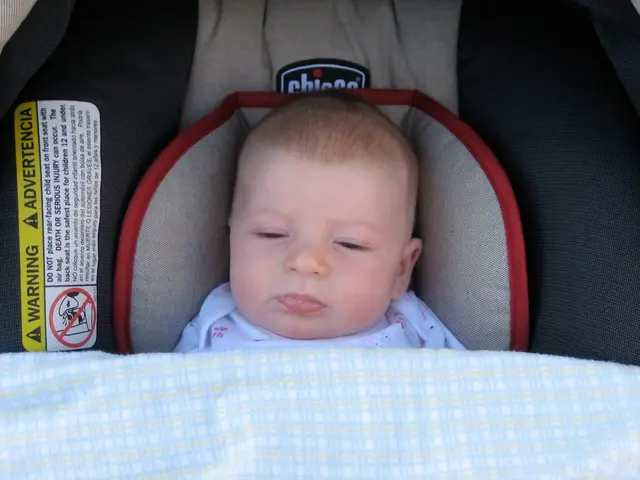Empowering Families: Home Care for Seriously Ill Children in Hesse
- *
Allocating assistance for critically unwell children and their loved ones. - Strategies for Aiding Sick Children and Their Loved Ones During Critical Times
Dealing with a seriously ill child can be a daunting task for any family. In Hesse, three children's palliative care teams in the north, central, and south regions offer support to ease this burden. Their main objective is to alleviate distressing symptoms in the child and strengthen the family unit. Through Specialized Outpatient Palliative Care (SAPV), these teams help incurably ill children remain at home with their families until the end.
In Kassel, a new initiative called "Kleine Riesen Haus" is being established to tackle this issue head-on. This unique facility will allow parents to learn how to care for their seriously ill child at home. The goal is to act as a bridge between hospital care and home care, enhancing the family's ability to provide necessary care for their loved one.
According to Thomas Voelker, head of the "Kleine Riesen Nordhessen" children's palliative care team, there is a growing need for home care services due to a lack of specialized personnel in the region. Despite this, there is an increasing number of chronically ill children who require care, thanks to advancements in medical and nursing support.
Home Care Guidance
The "Kleine Riesen Haus" will accommodate and guide up to eight families beginning in late 2026, allowing them to stay for a few weeks to up to three months. During their stay, families will receive support from an interdisciplinary team consisting of nurses, doctors, psychologists, and therapists. They will learn essential skills for caring for their child, such as how to best use aides and what to do if outpatient children's nursing service is not available. Families can be admitted after a hospital stay or directly from their homes.
"We tailor our approach to the needs of each family," explains Voelker. Parents will learn answers to questions like, "What are all these technical aids for? How do I change cannulas? How do I handle a breathing tube?" They will also have the opportunity to practice everyday tasks, such as going shopping with a severely ill child while using necessary equipment like oxygen and suction devices.
Funding and Partnerships
The new building in Kassel is estimated to cost around eight million euros. The state of Hesse is contributing two million euros to the project, and the city of Kassel is providing a building cost subsidy of 500,000 euros. A contract has been signed with AOK Hesse for the care courses.
The offer is aimed at affected families across central Germany, reaching from Hannover to Koblenz and from Bielefeld to Jena. Nationwide, there is only one comparable project in Hamburg, but the "Kleine Riesen Haus" in Kassel is the first building dedicated to this concept.
Addressing the Shortage of Specialists
The Hesse Hospice and Palliative Care Association welcomes the project in Kassel. Bettina Mathes, the association’s representative for hospice care, emphasizes the need for more specialists to meet local demands. She notes that families often find themselves becoming caregiver experts due to the lack of specialists in the area.
The Hessian Ministry of Health insists that there are no indications of a shortage of skilled professionals in pediatric and youth palliative care. The state supports these initiatives, ensuring families receive the care they need.
Wide Spectrum of Illnesses
Vera Vaillant, head of the Central Hesse Children's Palliative Care Team at the University Hospital in Gießen, stresses the need for specialized care in dealing with the wide range of illnesses the teams encounter. These include childhood dementia, inherited metabolic disorders, heart defects, organ failures, brain damage, and cancer. Many of these diseases are rare, making the need for specialized care providers crucial.
Financial Challenges and Donations
Families often face financial burdens as both parents are unable to work normally to care for their child. To address this issue, children's palliative care teams are reliant on donations to support aspects of care not covered by health insurance, such as psychological and social work within the team.
"There are many gaps that are filled through donations," explains Boris Knopf from the South Hesse Children's Palliative Care Team in Frankfurt. "We are extremely grateful to all the people who are engaged in various projects and are open to the fact that there is a need."
[1] [https://www.kleineriesen.de/][2] [https://www.hessenschau.de/studio/studio-suedhessen/klinikum-kassel-neutrag-kinderpalliative-pflege/2022/10/28][3] [https://www.hessenschau.de/studio/studio-nordhessen/kleine-riesen-eur30-millionen-und-offnung-im-november/2022/01/13][4] [https://www.hessenschau.de/kreis#kleine-riesen-haus][5] [https://www.kleineriesen.de/praesentation/]
- The "Kleine Riesen Haus" in Kassel, a facility dedicated to supporting families with seriously ill children, is designed to provide vocational training to parents in home care for their children.
- The interdisciplinary team at "Kleine Riesen Haus" offers educational programs on the care of chronically ill children, including instruction on how to manage medical-conditions such as cannulas, breathing tubes, and the use of technical aids like oxygen and suction devices.
- The "Kleine Riesen Haus" initiative also addresses the issue of a lack of specialized personnel in Hesse, by providing resources and guidance to families addressing various health-and-wellness issues, including mental-health, parenting, and family-health challenges that arise as a result of having a seriously ill child.
- To bridge the gap between hospital care and home care, the "Kleine Riesen Haus" relies on partnerships and donations to offer psychological and social work within the team, addressing financial challenges faced by families with seriously ill children, ensuring they receive comprehensive care for their child's chronic diseases.








